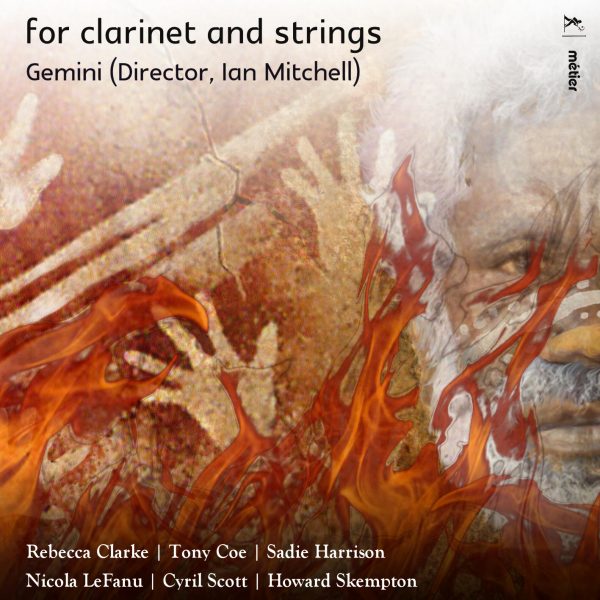Musical Opinion
MSV 28608 For Clarinet and Strings
As elucidated by the title, this release on the Métier label by the Gemini Ensemble and their clarinettist leader Ian Mitchell features works written for clarinet and strings. The programme contains satisfying variants of this instrumental combination, from quintets to a quartet and couple of duos.
Completed in 1951, Cyril Scott’s Clarinet Quintet was revised two years later and it is the revised version which is presented on this recording. The piece is in a single movement divided into a number of sections, some vigorous and intensely dramatic, others hesitant and ethereal. This gives the music a distinctly mercurial quality, intensified by the melodic lines’ rubato and frequent tempo fluctuations. There is also a wistful reticence to the material, which often hangs back, biding its time before embarking upon the next episode. Alert to every shift in mood, the players ensure each tiny arrest in the musical flow never disrupts this elegant and earnest score’s nuanced narrative.
Nicola LeFanu’s Songs without Words, for clarinet and string trio (2005) was written for Ian Mitchell and Gemini. The composer’s ethical and political beliefs underpin this set of miniatures, and a burning conviction drives the lucid musical lines of the closely argued second movement, for example, which is based on a protest against dispossession from a radio opera by LeFanu. The other three miniatures consist of an opening soliloquy for clarinet, a rhythmic, folk-like movement championing Catalan independence, and a poised and elegiac extended finale, commemorating in particular those dying in the Middle East. Songs without Words is one of the composer’s most directly expressive pieces and it is realised with care and discernment in this searching account.
Lullaby, for clarinet and cello (1983) by Howard Skempton is simple and effective. Its opening and closing passages for cello recall Bach’s Suites in their serenity. In the central section, Ian Mitchell joins cellist Sophie Harris for some heartfelt counterpoint.
Tony Coe’s Dream Odyssey for clarinet and string quartet (2006) tells a lively tale of a man who imagines being led into a wood by mysterious lights. His way home is illuminated by a brightly coloured bird of fortune. The piece can be enjoyed as pure music, detached from its programme and it is fluently rendered by the players.
Prelude, Allegro and Pastorale for clarinet and viola (1941) by Rebecca Clarke is memorable and satisfyingly well-balanced. An understated, dark-hued ‘Prelude’ is followed by a spirited ‘Allegro’ full of rhythmic ingenuity. The duo closes with a sombre ‘Pastorale’ that begins and ends introspectively, but reveals a more agitated disposition at its heart. Violist Yuko Inoue joins Ian Mitchell in a vivid, compelling performance.
In Sadie Harrison’s Fire in Song, for clarinet, viola and two clapstick-playing narrators (2020), the creation story about fire is told by the Yolngu group of Aboriginal Australians. The work was written during the catastrophic bush fires that swept much of Australia in 2019-2020 and reflects on the Aboriginal approach to these fires.
A passionately declamatory opening movement, The World’s Lament gives way to a set of movements based on Aboriginal songs and dances from Northern and Central Australia. After a gleeful movement entitled Bandicoot and the Hollow Log, Aboriginal clapstick strokes usher in Quail and the Burning Twig, in which the viola produces grey, ashen colours under the clarinet’s breathy held notes. The tempo increases for the lively, dance-like Honey Bees and the Paperbark Swamp. In Honey Bees and the Tall Grass, relentless clapsticks, earthy viola an clarinet in its chalumeau register perform a stomping bee dance. In the following movement the story of fire’s creation by Bäru, the Saltwater Crocodile,, and the joyful unification of clans as it was spread across Australia by animals, insects and birds, is recited by percussionists (Alexander Szram and Sophie Harris) to the pulse of clapsticks. In the closing movement the instruments sound with one angry voice their Lament for the Whole World.
In her deeply felt, powerfully communicative score, Sadie Harrison voices her concern about the state of our planet’s ecology in time-honoured forms such as songs and dances. There is rage as well as exuberance in what is perhaps the most sincerely personal musical statement this thoughtful, ardent composer has given us to date.
As a bonus track on this well-filled CD, we are gifted Howard Skempton’s beguilingly homespun Gemini Dances, for flute, clarinet, violin, cello, percussion and piano (1994). Ranging from a sprightly ‘alla marcia’ to the serpentine chant-like Vivo, the set of diverse movements is framed by an affecting Comodo, which has the solemn innocence of youth.
This highly desirable release offers valuable additions to the chamber music repertoire in committed, instinctive performances. Recording quality and booklet content and presentation are exemplary.
@divineartrecordingsgroup
A First Inversion Company
Registered Office:
176-178 Pontefract Road, Cudworth, Barnsley S72 8BE
+44 1226 596703
Fort Worth, TX 76110
+1.682.233.4978












